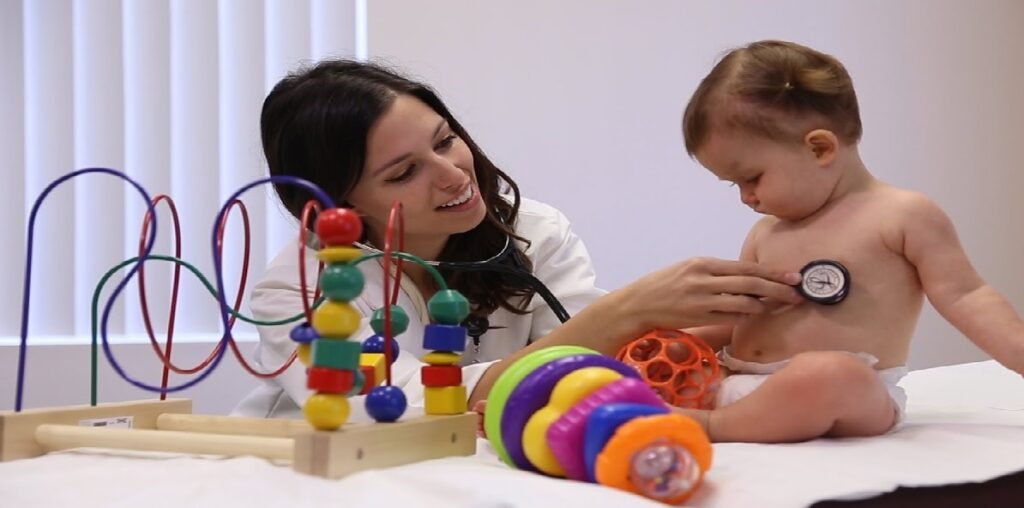
7 Steps: Radiant Pediatric Nurse Practitioner Ascension.
The world of pediatric healthcare is a realm of boundless energy, vulnerability, and the profound potential for healing. Within this dynamic space, the Pediatric Nurse Practitioner (PNP) stands as a beacon of expertise, compassion, and advocacy. Today, we embark on a journey, not just of career progression, but of “Radiant Pediatric Nurse Practitioner Ascension.” This isn’t merely about climbing a ladder; it’s about illuminating your path, nurturing your passion, and achieving a level of professional fulfillment that radiates positivity and transformative impact.
“This guide transcends the typical career manual. It’s a roadmap to cultivating a career that aligns with your deepest values, leverages your unique strengths, and empowers you to make a lasting difference in the lives of children and their families. Each of the “7 Steps” is a milestone, a strategic pivot, and a moment of self-discovery. This article is designed to be your companion, your mentor, and your inspiration as you, a dedicated Pediatric Nurse, navigate the fulfilling, yet demanding, path of a PNP. It is especially designed for the aspiring Pediatric Nurse that wants to achieve ascension. We believe that every Pediatric Nurse has the ability to achieve a radiant career.”
We will explore not only the practicalities of the role but also the emotional and intellectual dimensions that make this profession so profoundly rewarding. We’ll delve into the nuances of child development, the art of family-centered care, and the power of evidence-based practice. Get ready to illuminate your career with knowledge, purpose, and the radiant energy that defines the true essence of a Pediatric Nurse Practitioner.
1: Laying the Foundation – Approximately

Educational Excellence:
- “The journey begins with a solid educational foundation. For a Pediatric Nurse, this means discussing the importance of advanced nursing degrees (MSN or DNP) with a PNP specialization. Every aspiring Pediatric Nurse should understand that this advanced degree is the core foundation, and a qualified Pediatric Nurse is expected to have this level of education.”
- Highlight the significance of choosing accredited programs and the value of clinical rotations in diverse pediatric settings.
- Emphasize the importance of staying updated with the latest research and best practices in pediatric care.
Certification and Licensure:
- “Explain the certification process through organizations like the Pediatric Nursing Certification Board (PNCB), a crucial step for any aspiring Pediatric Nurse. This certification process is something every practicing Pediatric Nurse should be familiar with, and the PNCB is the primary organization that assists a Pediatric Nurse in this process.”
- Detail the state-specific licensure requirements and the importance of maintaining compliance, a critical aspect for every practicing Pediatric Nurse. For a Pediatric Nurse, understanding these state-specific requirements is essential, and every Pediatric Nurse must prioritize compliance.”
- Explain the importance of credentialing within hospitals, a vital process for any Pediatric Nurse seeking hospital employment. For a working Pediatric Nurse, understanding hospital credentialing is crucial, and every Pediatric Nurse should be aware of its significance.”
Developing Core Competencies:
- Discuss the essential skills required for a PNP, including advanced assessment, diagnosis, and treatment planning.
- Highlight the importance of communication, empathy, and cultural sensitivity in working with children and families.
- Importance of pharmacology knowledge, and recognizing side effects.
- Explain the importance of accurate documentation.
2: Cultivating Clinical Expertise – Approximately
Specialized Knowledge:
- Explore the various subspecialties within pediatrics, such as cardiology, neurology, and oncology.
- Discuss the benefits of pursuing additional training or certifications in a specific area of interest.
- Explain how to stay up to date with new medical guidelines.
Advanced Assessment and Diagnostic Skills:
- Detail the techniques for conducting thorough physical examinations and developmental assessments in children of different ages.
- Highlight the importance of interpreting laboratory and imaging results accurately.
- Explain how to recognize subtle signs of illness.
Evidence-Based Practice:
- Emphasize the importance of using research and clinical guidelines to inform decision-making.
- Discuss how to critically evaluate research studies and apply findings to clinical practice.
- How to effectively communicate findings to families.
3: Mastering Family-Centered Care – Approximately
Building Trust and Rapport:
- Discuss the importance of creating a welcoming and supportive environment for children and families.
- Highlight the skills for effective communication, active listening, and empathy.
- Explain how to deal with difficult conversations.
Empowering Families:
- Discuss the importance of involving families in decision-making and providing them with the information and resources they need.
- Highlight the strategies for educating families about child development, health promotion, and disease prevention.
- Importance of knowing available community resources.
Cultural Competence:
- Emphasize the importance of understanding and respecting cultural differences in health beliefs and practices.
- Discuss strategies for providing culturally sensitive care and addressing health disparities.
- Importance of using interpreters when needed.
4: Advocating for Children’s Health – Approximately
Community Engagement:
- Discuss the role of the PNP in advocating for children’s health at the community level.
- Highlight the opportunities for participating in health promotion programs and policy initiatives.
- Explain how to network with community leaders.
Policy and Legislation:
- Discuss the importance of staying informed about legislation and policies that affect children’s health.
- Highlight the opportunities for advocating for changes that improve access to care and promote health equity.
- How to contact legislators.
Addressing Health Disparities:
- Discuss the importance of recognizing and addressing health disparities among children from different backgrounds.
- Highlight the strategies for providing culturally competent care and promoting health equity.
- Explain the social determinants of health.
5: Embracing Leadership and Collaboration – Approximately
Inter professional Collaboration:
- Discuss the importance of working effectively with other healthcare professionals, such as physicians, nurses, and social workers.
- Highlight the strategies for effective communication and teamwork.
- Explain how to resolve conflict within teams.
Mentorship and Education:
- Discuss the role of the PNP in mentoring and educating other healthcare professionals.
- Highlight the opportunities for providing clinical supervision and preceptorship.
- Explain how to give effective presentations.
Leadership Opportunities:
- Discuss the various leadership roles available to PNPs, such as clinical manager, educator, and researcher.
- Highlight the skills and qualities required for effective leadership.
- Importance of continuing education.
6: Nurturing Professional Growth – Approximately
Continuing Education:
- Emphasize the importance of staying up-to-date with the latest research and best practices in pediatric care.
- Highlight the opportunities for attending conferences, workshops, and online courses.
- Explain how to maintain certification.
Professional Organizations:
- Discuss the benefits of joining professional organizations, such as the National Association of Pediatric Nurse Practitioners (NAPNAP).
- Highlight the opportunities for networking, advocacy, and professional development.
Self-Care and Resilience:
- Acknowledge the emotional demands of the role.
- Discuss the importance of maintaining work-life balance and practicing self-care.
- Highlight strategies for building resilience and preventing burnout.
7: Radiating Impact and Fulfillment – Approximately
Measuring Impact:
- Discuss the importance of evaluating the impact of your work on children and families.
- Highlight the strategies for collecting and analyzing data on patient outcomes and satisfaction.
- Explain how to use data to improve care.
Finding Joy and Purpose:
- Emphasize the importance of connecting with the joy and purpose of your work.
- Highlight the strategies for maintaining a positive outlook and finding meaning in your daily practice.
- Importance of reflection.
Leaving a Legacy:
- Discuss the potential for PNPs to leave a lasting legacy in the field of pediatric healthcare.
- Highlight the opportunities for mentoring future generations of PNPs and contributing to the advancement of the profession.
- Explain how to advocate for systemic change.
Cultivating Clinical Expertise
Navigating Complex Cases:
- “Pediatric care often involves intricate cases that require a high degree of clinical acumen. As a Pediatric Nurse, you must develop critical thinking skills to manage children with multiple comorbidities or rare conditions; this is a vital skill for every Pediatric Nurse. 1 For a Pediatric Nurse, understanding the nuances of these complex cases is paramount.
- Explain the process of differential diagnosis and how to effectively utilize diagnostic tools and consultations with specialists.
- Detail the importance of staying current on emergent care protocols for pediatric patients.
Technological Proficiency:
- The healthcare landscape is increasingly reliant on technology. Highlight the importance of being proficient in electronic health records (EHRs), telemedicine platforms, and other digital tools.
- Discuss how technology can enhance patient care, improve communication, and facilitate data analysis.
- Explain the importance of understanding medical devices, and their proper use.
Pharmacological Nuances:
- Children’s physiology differs greatly from adults. Because of that, medication dosages, and administration require very specific knowledge.
- Detail the importance of understanding the pharmacokinetics and pharmacodynamics of medications in pediatric patients.
- Explain how to monitor for adverse drug reactions and adjust dosages accordingly.
Mastering Family-Centered Care
Managing Parental Anxiety:
- Parents often experience significant anxiety when their child is ill. Discuss strategies for addressing parental concerns and providing reassurance.
- Highlight the importance of active listening, empathy, and clear communication in managing parental anxiety.
- Explain how to help parents understand complex medical information.
Working with Diverse Family Structures:
- Recognize the diversity of family structures, including single-parent families, blended families, and LGBTQ+ families.
- Discuss the importance of providing inclusive and respectful care to all families, regardless of their structure.
- Explain how to adapt communication and care plans to meet the unique needs of each family.
Addressing Behavioral and Mental Health:
- Pediatric primary care providers are frequently the first line of defense for detecting behavioral or mental health issues.
- Explain the importance of using screening tools and assessment instruments to identify children at risk.
- Discuss the strategies for providing early intervention and referral to mental health specialists.
School Health Advocacy:
- PNPs play a vital role in advocating for children’s health within school settings.
- Discuss the importance of collaborating with school nurses, teachers, and administrators to promote health and wellness.
- Explain how to advocate for policies that support children with chronic health conditions.
Addressing Social Determinants of Health:
- Recognize that children’s health is influenced by a wide range of social factors, such as poverty, housing, and food security.
- Discuss strategies for addressing these social determinants of health in clinical practice and community settings.
- Explain how to connect families with resources and support services.
Child Abuse Prevention:
- PNPs are mandated reporters. It is critical to know how to recognize and report suspected child abuse or neglect.
- Discuss the importance of creating a safe and supportive environment for children and families.
- Explain how to provide education and resources on child abuse prevention.
Nurturing Professional Growth

Research and Scholarship:
- Engage in research and scholarship to advance the field of pediatric nursing.
- Discuss opportunities for conducting clinical research, publishing articles, and presenting at conferences.
- Explain how to translate research findings into clinical practice.
Developing a Professional Portfolio:
- Create a professional portfolio to showcase your skills, accomplishments, and contributions to the field.
- Discuss the importance of documenting your clinical experience, continuing education, and leadership activities.
- Explain how to use your portfolio to advance your career.
Building a Professional Network:
- Networking with other professionals is extremely important.
- Discuss the importance of building relationships with other PNPs, physicians, and healthcare leaders.
- Explain how to use social media and professional platforms to connect with colleagues.
- Importance of attending conferences, and local chapter meetings.
By adding these additional sections, we create a more comprehensive and actionable guide for aspiring and practicing Pediatric Nurse Practitioners, further illuminating their path to a radiant and impactful career.
Laying the Foundation
Understanding Child Development:
- A deep understanding of child development is foundational to effective pediatric care. Discuss the importance of studying developmental milestones across various age groups.
- Highlight the significance of recognizing developmental delays or deviations and the strategies for early intervention.
- Explain the importance of understanding the psychosocial development of children, and how that effects their health.
Ethical Considerations:
- Pediatric care often involves complex ethical dilemmas. Discuss the importance of adhering to ethical principles, such as autonomy, beneficence, non-maleficence, and justice.
- Highlight the importance of informed consent, confidentiality, and protecting children’s rights.
- Explain how to handle situations involving conflicting values between families and healthcare providers.
Health Promotion and Disease Prevention:
- PNPs play a crucial role in promoting health and preventing disease in children. Discuss the importance of providing education on healthy lifestyle habits, such as nutrition, physical activity, and sleep.
- Highlight the importance of immunizations and health screenings.
- Explain how to create individualized health promotion plans for children and families.
Documentation and Legal Aspects:
- Accurate and thorough documentation is essential for legal and clinical reasons.
- Explain the importance of understanding legal requirements related to patient records, consent, and reporting.
- Discuss the importance of maintaining confidentiality and adhering to HIPAA regulations.
Embracing Leadership and Collaboration

Quality Improvement Initiatives
- PNPs can play a key role in improving the quality of pediatric care. Discuss the importance of participating in quality improvement initiatives.
- Highlight the strategies for collecting and analyzing data on patient outcomes and satisfaction.
- Explain how to implement evidence-based practices and improve clinical workflows.
Conflict Resolution and Negotiation:
- Healthcare settings can involve conflict among team members or between healthcare providers and families. Discuss the importance of developing conflict resolution and negotiation skills.
- Highlight the strategies for effective communication, active listening, and problem-solving.
- Explain how to create a collaborative and respectful work environment.
Mentoring and Precepting:
- Giving back to the profession is very important.
- Discuss the importance of mentoring and precepting new PNPs and nursing students.
- Highlight the strategies for providing effective clinical supervision and guidance.
- Explain how to create a supportive learning environment.
Telehealth and Remote Care:
- Telehealth is increasingly important in pediatric care.
- Discuss the importance of understanding and utilizing telehealth technologies.
- Highlight the strategies for providing effective remote care and addressing the challenges of telehealth.
- Explain the legal and ethical considerations of telehealth.
Radiating Impact and Fulfillment
Creating a Positive Work Environment:
- A positive work environment contributes to job satisfaction and patient care.
- Discuss the importance of fostering a culture of collaboration, respect, and support.
- Highlight the strategies for promoting teamwork and recognizing the contributions of team members.
Personal Growth and Reflection:
- Continuous personal growth is essential for maintaining fulfillment in the role.
- Discuss the importance of self-reflection, mindfulness, and setting personal goals.
- Highlight the strategies for managing stress and maintaining a healthy work-life balance.
Innovation and Creativity:
- The field of pediatric healthcare is constantly evolving.
- Discuss the importance of embracing innovation and creativity in clinical practice.
- Highlight the strategies for developing new approaches to care and improving patient outcomes.
- Explain how to stay up to date with new technologies and treatments.
Advocacy for Systemic Change:
- PNPs can advocate for systemic changes that improve the health of all children.
- Discuss the importance of participating in advocacy efforts at the local, state, and national levels.
- Highlight the strategies for influencing policy and promoting health equity.
- Explain how to collaborate with other organizations to achieve common goals.
Conclusion
The “7 Steps: Radiant Pediatric Nurse Practitioner Ascension” is more than a guide; it’s an invitation to cultivate a career that shines with purpose, expertise, and unwavering compassion. As you, a dedicated Pediatric Nurse, progress along this path, remember that your contributions are invaluable, your impact is transformative, and your dedication is a beacon of hope for children and families. This guide is especially for the Pediatric Nurse that seeks to excel in their career. Every Pediatric Nurse can embrace the journey, radiate their passion, and ascend to the pinnacle of their potential as a Pediatric Nurse Practitioner.
FAQ
Q1. What is the difference between a Pediatric Nurse Practitioner (PNP) and a Pediatrician?
A: While both provide pediatric care, a PNP is an advanced practice registered nurse (APRN) with a master’s or doctoral degree, whereas a pediatrician is a medical doctor (MD or DO). PNPs can diagnose, treat, and manage illnesses, prescribe medications, and provide preventive care, often working collaboratively with physicians.
Q2. What are the typical work settings for a PNP?
A: PNPs work in a variety of settings, including primary care clinics, hospitals, specialty clinics (e.g., cardiology, neurology), school-based health centers, and community health centers.
Q3. What is the job outlook for PNPs?
A: The job outlook for PNPs is excellent, with strong demand due to the increasing need for pediatric primary and specialty care, as well as the growing emphasis on preventive care.
Q4.How much can a PNP expect to earn?
A: Salaries vary based on experience, location, and work setting. Resources such as the Bureau of Labor Statistics and professional organizations like NAPNAP offer salary data.
Q5. Is being a PNP stressful?
A: Like any healthcare profession, being a PNP can be stressful due to the demands of patient care and the emotional challenges of working with children and families. However, many PNPs find the work highly rewarding.
Q6. What certification is required to practice as a PNP?
A: Certification through the Pediatric Nursing Certification Board (PNCB) is generally required.
Q7.How long does it take to become a PNP?
A: The time frame varies, but typically involves 2-4 years of graduate study after obtaining a Bachelor of Science in Nursing (BSN).






